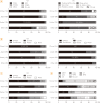Diagnosis of inflammatory bowel disease in Asia: the results of a multinational web-based survey in the 2(nd) Asian Organization for Crohn's and Colitis (AOCC) meeting in Seoul
- PMID: 27433144
- PMCID: PMC4945526
- DOI: 10.5217/ir.2016.14.3.224
Diagnosis of inflammatory bowel disease in Asia: the results of a multinational web-based survey in the 2(nd) Asian Organization for Crohn's and Colitis (AOCC) meeting in Seoul
Abstract
Background/aims: As the number of Asian patients with inflammatory bowel disease (IBD) has increased recently, there is a growing need to improve IBD care in this region. This study is aimed at determining how Asian countries are currently dealing with their IBD patients in terms of diagnosis.
Methods: A questionnaire was designed by the organizing committee of Asian Organization for Crohn's and Colitis, for a multinational web-based survey conducted between March 2014 and May 2014.
Results: A total of 353 Asian medical doctors treating IBD patients responded to the survey (114 in China, 88 in Japan, 116 in Korea, and 35 in other Asian countries). Most of the respondents were gastroenterologists working in an academic teaching hospital. While most of the doctors from China, Japan, and Korea use their own national guidelines for IBD diagnosis, those from other Asian countries most commonly adopt the European Crohn's Colitis Organisation's guideline. Japanese doctors seldom adopt the Montreal classification for IBD. The most commonly used activity scoring system for ulcerative colitis is the Mayo score in all countries except China, whereas that for Crohn's disease (CD) is the Crohn's Disease Activity Index. The most available tool for small-bowel evaluation in CD patients differs across countries. Many physicians administer empirical anti-tuberculous medications before the diagnosis of CD.
Conclusions: The results of this survey demonstrate that Asian medical doctors have different diagnostic approaches for IBD. This knowledge would be important in establishing guidelines for improving the care of IBD patients in this region.
Keywords: Asia; Diagnosis; Inflammatory bowel diseases; Survey.
Conflict of interest statement
Figures



References
-
- Baumgart DC, Carding SR. Inflammatory bowel disease: cause and immunobiology. Lancet. 2007;369:1627–1640. - PubMed
-
- Yang SK, Yun S, Kim JH, et al. Epidemiology of inflammatory bowel disease in the Songpa-Kangdong district, Seoul, Korea, 1986-2005: a KASID study. Inflamm Bowel Dis. 2008;14:542–549. - PubMed
-
- Ng SC, Bernstein CN, Vatn MH, et al. Geographical variability and environmental risk factors in inflammatory bowel disease. Gut. 2013;62:630–649. - PubMed
-
- Ye BD, Jang BI, Jeen YT, et al. Diagnostic guideline of Crohn's disease. Korean J Gastroenterol. 2009;53:161–176. - PubMed
LinkOut - more resources
Full Text Sources
Other Literature Sources
Research Materials

